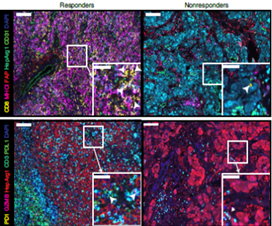Predicting treatment response in liver cancer
Hepatocellular carcinoma (HCC) is the most common type of liver cancer, occurring primarily in patients with chronic liver damage, such as that caused by hepatitis B, hepatitis C, or long-term alcohol use. It is the third-highest cause of cancer mortality worldwide. Unfortunately, because HCC develops slowly and can be asymptomatic for years, patients are often diagnosed at an advanced stage.
The current standard of care for advanced HCC is a combination of two drugs: an immunotherapy called atezolizumab, which removes the “brakes” from T cells, and a targeted therapy called bevacizumab, which inhibits a growth factor called VEGF in cancer cells. Not every HCC responds to this combination therapy, however, and clinicians do not yet have a good way to predict whether the treatment will work. To better guide treatment decision-making in advanced liver cancer, researchers need to identify what differs, on a molecular level, between patients who benefit from this therapy and those who do not.

respond to or resist treatment
A recent study by Damon Runyon-Rachleff Innovator Amaia Lujambio, PhD, and her colleagues at Icahn School of Medicine at Mount Sinai sheds new light on these differences. Analyzing tumor samples from 358 patients with advanced HCC, the team identified several shared molecular features among the patients who benefitted most from combination therapy. Chief among these was a strong pre-existing immune response, as indicated by the density of T cells inside tumors. The number of “brakes” on those T cells also made a difference: the more places for the immunotherapy drug to bind, the more effective the treatment. The same held true for patients whose cells expressed a high level of the receptor for VEGF, the targeted growth factor. On the other hand, the team found that patients with certain genetic markers—specifically, expression of the oncogenes GPC3 and AFP—saw reduced benefit from the treatment.
With this study, Dr. Lujambio and her colleagues have identified a number of potential biomarkers that clinicians can use to predict how their patients will respond to the prevailing HCC treatment, allowing for better prognostication and decision-making. Their findings also clarify the molecular mechanisms of treatment response and resistance in HCC, which may inform new therapeutic strategies for overcoming resistance and increasing the number of patients who benefit from similar combination therapies.
This research was published in Nature Medicine.
